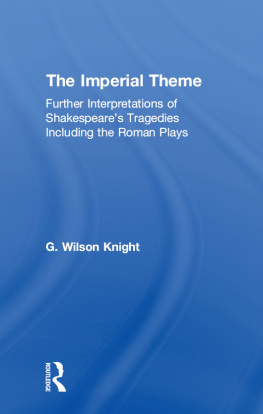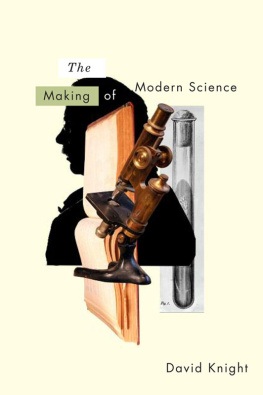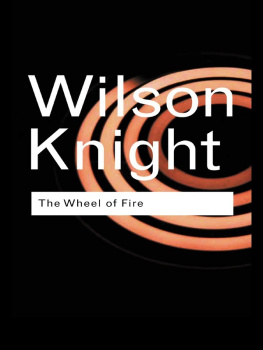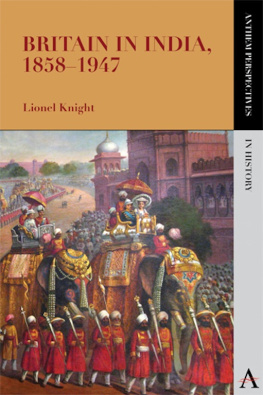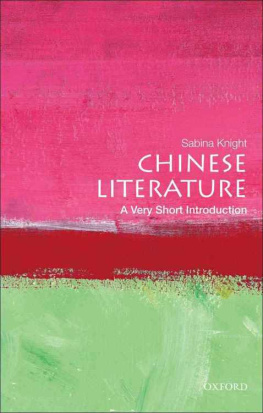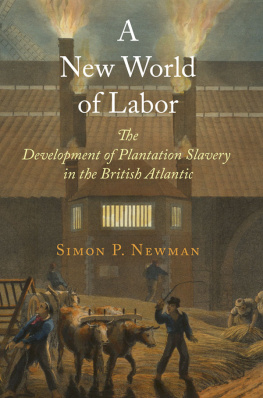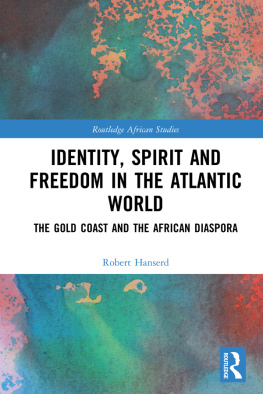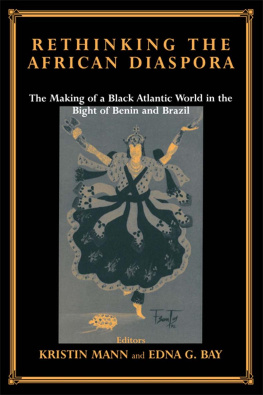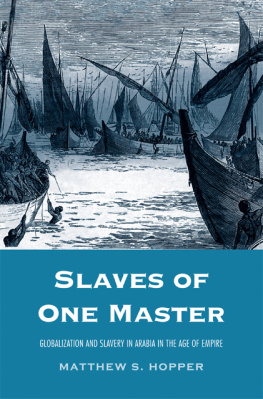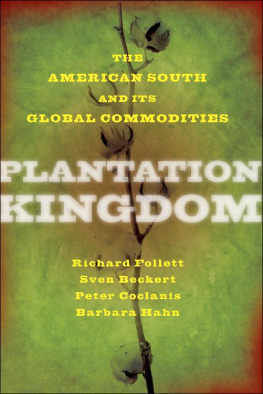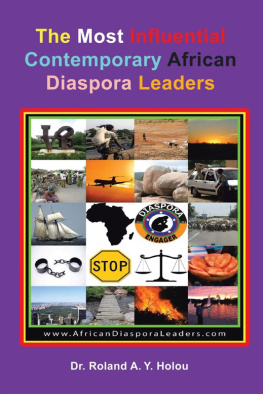Thank you for buying this ebook, published by NYU Press.
Sign up for our e-newsletters to receive information about forthcoming books, special discounts, and more!
Sign Up!
About NYU Press
A publisher of original scholarship since its founding in 1916, New York University Press Produces more than 100 new books each year, with a backlist of 3,000 titles in print. Working across the humanities and social sciences, NYU Press has award-winning lists in sociology, law, cultural and American studies, religion, American history, anthropology, politics, criminology, media and communication, literary studies, and psychology.
Working the Diaspora
CULTURE, LABOR, HISTORY
General Editors: Daniel Bender and Kimberley L. Phillips
Unknown Class:
Undercover Investigations of American Work and Poverty
from the Gilded Age to the Present
Mark Pittenger
Working the Diaspora:
The Impact of African Labor on the Anglo-American World, 16501850
Frederick C. Knight
Working the Diaspora
The Impact of African Labor on the Anglo-American World, 16501850
Frederick C. Knight

NEW YORK UNIVERSITY PRESS
New York and London
www.nyupress.org
2010 by New York University
All rights reserved
Library of Congress Cataloging-in-Publication Data
Knight, Frederick C.
Working the diaspora : the impact of African labor on the Anglo-American world, 16501850 / Frederick C. Knight.
p. cm.
Includes bibliographical references and index.
ISBN-13: 9780814748183 (cl : alk. paper)
ISBN-10: 081474818x (cl : alk. paper)
1. Slave laborAmericaHistory. 2. Agricultural laborers
AmericaHistory. 3. AfricansAmericaHistory.
4. BlacksAmericaHistory. 5. AgricultureAmericaHistory.
6. African diaspora. I. Title.
HD4865.A45K65 2009
331.117340970903dc22 2009026860
New York University Press books are printed on acid-free paper, and their binding materials are chosen for strength and durability. We strive to use environmentally responsible suppliers and materials to the greatest extent possible in publishing our books.
Manufactured in the United States of America
10 9 8 7 6 5 4 3 2 1
For Herman and Frances Knight
Contents
Acknowledgments
As I wrote this book, a myriad of friends, family members, colleagues, and mentors walked beside me. First, the Knight family gave me the encouragement and space that I needed to complete this project. Throughout my years on the road and in the academic world, my kin have kept me grounded. I send them all of my love. Sages at Morehouse College, particularly Marcellus Barksdale, Alton Hornsby Jr., William Parker, and Jacquelyn Rouse, set the foundation for my graduate training.
This project began in earnest while I was pursuing graduate studies in the history department at the University of California (UC) Riverside. Fellow graduate students Darnetta Bell, Carol Henderson, Ron Schneck, and Irene Vasquez created an oasis during my years in the desert, and Maurice Webb offered me invaluable friendship while I stood at a personal crossroad. Brian Lloyd, Robert Patch, Roger Ransom, Irwin Wall, and Devra Weber lived as model scholars and deepened my thinking about economic and labor history. I am particularly grateful to the always good-humored Sharon Salinger, whose expertise in early American history and comments on an earlier draft of the book challenged me to rethink the project in significant ways. Without Ray Keas guidance on African history, this project would not have taken form. His scholarly excellence and basic human decency have inspired me to become a better person.
UC Riversides history department funded my participation in the University of Californias Education Abroad program at the University of Ghana, where I took courses and conducted research in African studies. Graduate seminars in African social and political theory led by Professor George Hagan at the Institute of African Studies yielded important insights into the internal dynamics of African history. Historians Kofi Baku and Irene Odotei provided valuable guidance and inspiration during this projects infancy. Yaw Bredwa Mensah and James Anquandah invited me to their archeological digs, expanded my knowledge about West African material culture, and discussed with me in depth the methodological challenges of my own research. Desmond Appiah, Ekua Arhin, Albert Edmond, Maya Harris, Fiker Kebede, Theresa Kwakye, David Stevens, David Stimson, and Sean Theus accompanied me through the harvest, Harmattan, and rainy seasons in the tropics.
The University of California Santa Barbaras Center for Black Studies funded my research with a dissertation year fellowship. While I was at the center, the faculty in the department of black studies prompted me to plunge into the history of an ocean people thousands of miles away. Cedric and Elizabeth Robinson served as models of integrity and generosity. Avery Gordon, the late Kofi Buenor Hadjor, Otis Madison, Christopher McAuley, Jacob K. Olupona, Oyeronke Oyewumi, Grard Pigeon, and Earl Stewart offered their mentorship at critical moments. Sylvia Curtis and Alyce Harris helped me track down materials in UC Santa Barbaras library. Above all, Douglas and Kryah Daniels and Claudine Michel made my year in Santa Barbara feel as close to home as possible.
The history department at the University of Memphis provided me with an intellectual home and financial support during an important phase of this project. In particular, then chair Kenneth Goings offered steady leadership, and Beverly Bond set a fine example as a teacher/scholar. The friendship of Harry Bryce, Paul Heron, Ramona Houston, Mukti Khanna, and Rajmohan Ramanathapillia allowed me to stay grounded and place my scholarship in perspective. Their commitment to social change fired my own. My dear friends Dennis and Rebecca Laumann, whom I first met in Ghana, provided me with many hours of conversation and laughter over great food, especially at Lotus.
My year as a postdoctoral fellow in the Center for the Advanced Study of Africa and the Atlantic World at the University of Virginias Carter G. Woodson Institute for African and African-American Studies was one of the most enjoyable and valuable of my life. I was fortunate to be surrounded by a group of colleagues who read my work, pushed me to think more deeply, and offered their personal kindness. I am deeply honored to have worked alongside Wallace Best, Reginald Butler, Jeffrey Fleisher, Scot French, Jerome Handler, Meta Jones, Wende Elizabeth Marshall, Joseph Miller, Isabel Mukonyora, Dylan Penningroth, Jemima Pierre, Hanan Sabea, Scott Saul, Robert Vinson, Bryan Wagner, and Corey D. B. Walker.
Since my move to Colorado, friends and colleagues have helped me press forward with this project. My colleagues in the history department, particularly Ruth Alexander, Ann Little, and Doug Yarrington, have been stalwart supporters. The financial support of the College of Liberal Arts allowed me to accept a postdoctoral fellowship at UC Riverside. More than the big skies and majestic landscape of Colorados front range, Adrian Gaskins, Rachel and Vincent Harding, Arthur McFarlane, and Linda Potter offered me refuge.
This book has been woven together with threads from a number of sources. The history department at UC Riverside awarded me its first P. Sterling Stuckey Postdoctoral Fellowship in African-American History, which helped me to deepen and expand my work. The John Nicholas Brown Center for the Study of American Civilization awarded me a fellowship that funded my research in archives in Providence, Rhode Island. Vikki Vickers of Weber State University invited me to present a portion of my manuscript as part of their history departments lecture series. Michael Gomez, who sets a standard for me of scholarly excellence and intellectual depth, graciously invited me to present my work at New York Universitys African Diaspora Forum.
Next page

